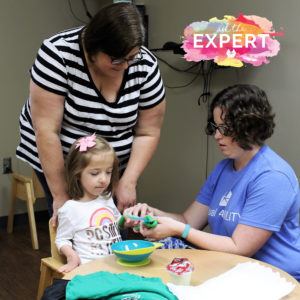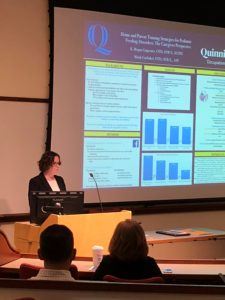Family Training – The Vital Link
Merriam Webster defines family in many ways. In one sense, it is a set of parents and a child or children all living under one roof. The definition also refers  more generally to a group of individuals living under one roof. Another more striking definition is a group of people united by common convictions and principles (Webster, 2018). Another important definition is of the word training: to acquire a skill or knowledge by one who teaches or trains (Webster, 2018). Essentially, the act of family training can be seen as teaching a group of individuals, united by common principles, a skill, or specific knowledge. We experience this unique set-up through the many services offered at United Ability to help young children with special needs and their families grow and thrive. Family training is a vital link to helping foster success with our families.
more generally to a group of individuals living under one roof. Another more striking definition is a group of people united by common convictions and principles (Webster, 2018). Another important definition is of the word training: to acquire a skill or knowledge by one who teaches or trains (Webster, 2018). Essentially, the act of family training can be seen as teaching a group of individuals, united by common principles, a skill, or specific knowledge. We experience this unique set-up through the many services offered at United Ability to help young children with special needs and their families grow and thrive. Family training is a vital link to helping foster success with our families.
Early Intervention (EI) is often the first interaction a family has with the therapy world when their child has a special need. EI is a unique practice area in which the staple is a provider entering the family’s natural environment (i.e. their home) to provide services to help the child learn and grow. What is more important about EI is the model of care is focused on family training and providing holistic, family-centered care. The family begins a collaboration with EI providers at the first stage with evaluations and goal setting and continues this until the child no longer needs EI services or ages out of the program. Through this journey, a strong rapport is built between the family and therapist in which the family may rely on the providers for strength and encouragement through this new journey. We as providers are welcomed into each family’s home and lives during some intimate and vulnerable times, and it is a true gift to be able to assist these families during these times. We have all heard the phrase that it takes a village to raise a child, and EI sets the stage for building a collaborative village between providers and each family.
Since United Ability offers a variety of programs to help children and adults with disabilities grow and learn, many of the providers have shifted in and out of various roles at United Ability. Even with these shifts, one thing remains constant in the care that each provider gives to a child and family, and that is family training. Since the value of collaboration and continuation of care into the home is so important to a child’s development, we continue to provide family-centered and holistic care through our outpatient program. Research has shown that intensive therapy, the more the child engages in therapy, the more benefit they will have, and this includes physical, occupational, and speech therapies (Storvold, et. al., 2018). It can be difficult to achieve this high level of treatment with insurance regulations abounding, which leads to the importance of family training to continue skill development more frequently and in the home.
 Feeding and eating are critical activities of daily living and create secondary effects on the parents as caregivers when there is a problem with those activities (Suarez et al., 2014). Research also suggests parent training, in many different forms, is vital to treatment of feeding disorders in children and should be a main component of such programs (Matson et al., 2009) in order to accomplish generalization of skills into the natural environment of the child (Sharp et al., 2016; Sharp et al., 2017).
Feeding and eating are critical activities of daily living and create secondary effects on the parents as caregivers when there is a problem with those activities (Suarez et al., 2014). Research also suggests parent training, in many different forms, is vital to treatment of feeding disorders in children and should be a main component of such programs (Matson et al., 2009) in order to accomplish generalization of skills into the natural environment of the child (Sharp et al., 2016; Sharp et al., 2017).
I recently conducted my own research on the caregiver’s perspective of home training to treat a child’s feeding disorder and how this training has affected the parent-child relationship. What was discovered is that caregivers are receiving current and evidence-based methods of home training to supplement treating their child’s feeding delay/disorder; they feel supported but feel they need more support, especially from their current feeding professional, and relationships in the family are adversely affected. The results also revealed caregivers are seeking more connections with other caregivers experiencing the same situations they are and have identified a need for personal stress management and coping skills not offered as home training. Three main themes were emphasized that showed how the caregivers feel supported by their feeding therapist and included: the ability of the professional to adapt and modify treatment to meet the needs of the child, having good communication through phone calls and texts outside of treatment sessions, and being a quality listener. Caregivers also stressed home training should also cover coping skills for parents, and feeding therapy should start when the child is at a younger age. Family training to help treat a child’s feeding delay/disorder is a vital component of feeding treatment and helps support holistic and family-centered treatment models. Continuing to provide these treatment models is the way for feeding treatment to advance and can continue to do so by offering more family-focused treatment topics addressing relationships and parent-child interactions, caregiver burden and stress management, and increased caregiver support in various forms.
Family training begins in EI and continues on as the child gets older and continues to grow, learn, and develop. It remains the vital link to the success of our families and is truly needed in today’s treatment models.
Dr. K. Megan Carpenter. OTD, OTR/L, SCFES and is AOTA Certified in Feed, Eating, and Swallowing. She is an experienced Occupational Therapist is an integral part of both United Ability’s Hand In Hand Early Intervention Program and the Ability Clinic Outpatient program. For more information on our Outpatient Therapy program or to schedule an appointment, please call 205-944-3921 or email UAClinic@unitedability.org.
References:
Family. 2018. In Merriam-Webster.com. Retrieved May 21, 2011
Matson, J.L., Mahan, S., & LoVullo, S.V. (2009). Parent training: A review of methods for children with developmental disabilities. Research in Developmental Disabilities, 30, 961-968. doi:10.1016/j.ridd.2009.01.009
Sharpe, W.G., Stubbs, K.H., Adams, H., Wells, B.M., Lesack, R.S., Criado, K.K.,…Scahill, L.D.
(2016). Intensive manual-based intervention for pediatric feeding disorders: Results from
a randomized pilot trial. Journal of Pediatric Gastroenterology and Nutrition, 62(4), 658
663. doi:10.1097/MPG.0000000000001043
Sharp, W.G., Volkert, V.M., Schahill, L., McCracken, C.E., & McElhanon, B. (2017). A
systematic review and meta-analysis of intensive multidisciplinary intervention for
pediatric feeding disorders: How standard is the standard of care. The Journal of
Pediatrics, 181, 116-124.
Suarez, M.A., Atchison, B.J., & Lagerwey, M. (2014). Phenomenological examination of the
mealtime experience for mothers of children with autism and food selectivity. American
Journal of Occupational Therapy, 68(1), 102-107. http://dx.doi.org/10.5014/ajot.2014.008748
Storvold, G. V., Jahnsen, R. B., Evensen, K. A. I., Romild, U. K., & Bratberg, G. H. (2018). Factors associated with enhanced gross motor progress in children with cerebral palsy: A register- based study. Physical and Occupational Therapy in Pediatrics, DOI: 10.1080/01942638.2018.1462288
Training. 2018. In Merriam-Webster.com. Retrieved May 21, 2011 from
